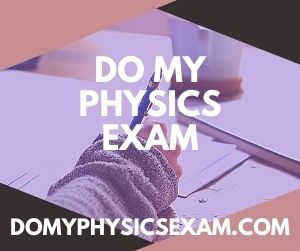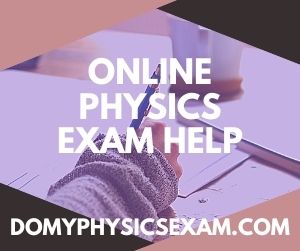Physics Exam Help Checklist

Please proceed with your order so that we can facilitate taking your exam on your behalf. Click Here
Do My Physics Exam For Me
Physics Exam Help
We provides the very best Physics exam help as we have skilled professionals to try Physics exams for you.
Physics Test Help
Get the assistance you require for your Physics test through our physics exam help options for examinations.
Physics Quiz Help
Hire a professional and get Physics quiz help to get A+ grade. DoMyPhysicsExam.com has specialists in all domains who can assist you getting A+ in your Physics quiz.
Do My Physics Exam

Most students who enter the University with an interest in physics feel they have the answers to any of the questions that might come up when they are taking a do my physics exam. The question is then, Physiology Exam Help Online how prepared are they?
Even though the examination is not that difficult, most students are very nervous about it. If you feel like you are not up to par for taking this exam then there are some things that you can do to help prepare for it.
One thing you can do to help prepare for your exam is to read the textbook. Read all of the topics that are covered in the book and find out as much as you can about them. When you do so you will know exactly what questions to expect on the exam.
Before you take your first physics course, you should have studied the topics that are mentioned in the textbook. You should know at least the basics of physics so that you will be able to go into the exam knowing the answer.
Another thing that you can do to help prepare for your exam is to write down any questions you might have. Try to answer any question that comes to mind so that you will not make the same mistakes twice.
It is important that you study your textbook and practice doing all of the experiments before taking the exam. The exam is designed to measure how much you understand so it is important that you have practiced the concepts on paper before taking the exam. The last thing you want to do is have a bad grade on your first exam.
One last thing you can do to help prepare for your exam is to look online for information on the topic of your test. There are many websites that offer different courses on the subjects that you will be required to know about on your exam.
Good luck in your exam. If you prepare for it you will be successful. Remember that the test is designed to measure how much you know about a particular subject and so it is important to know as much as you can about the topic so that you will be able to pass the exam.
Take a few minutes to browse through the internet and see if there is anything that you can learn about your exam. When you know as much as possible about the subject, you will know which way to turn when you need to improve your score. If you are not sure of something then don’t worry. There are many helpful people online that will help you if you need help.
Remember that there are no shortcuts to getting your first grade on your exam. So keep your focus on the things you know best and remember that the more you study and practice, the better your chances will be of passing the test.
Once you get your degree you will want to work hard at your job and show your employer that you have done a good job. This is why it is so important to understand your strengths and weaknesses and work on them every day to show them to the company.
The more you can do to prepare for your test, the more likely you will be to be successful. Also remember that the exam is going to be taken as a class so you need to listen to the teacher and be prepared. There is no reason to rush through the information and get things done.
Take your time so that you get everything you have learned. Remember to read the test carefully and practice so that you have a solid foundation to base your knowledge on.
Get Physics Exam Help
 Many physics students and teachers are interested in getting physics exam help from a tutor or even a Physics teacher. They need it so that they can learn and improve the things that they have studied and learn for the exams that they are going to take at school.
A tutor is usually someone who has some teaching experience and knows some things about the subject. He or she can really help you with your homework, study, and how to prepare for your tests.
On the other hand, if you want to get from a Physics teacher, you might want to know a few things first. You will need to find a teacher who is qualified to teach the particular course you are taking.
Of course, you will not be able to find a good teacher by looking online. There are so many websites out there that offer the same thing. You will just end up wasting money and time when you choose a wrong site.
The best places to find a teacher is by looking for him or her through online forums. It’s one of the easiest ways to find one. Teachers usually post in these forums on topics like Physics test help and what books to use.
You can also read their posts if you search the different forums and message boards in forums related to this subject. If they have a website, you will see it too.
You will probably notice that there are many different forums out there that cater to Physics students and teachers. If you are looking for Physics exam help from a tutor, you should make sure that you check out the forums in the related forums.
You will be able to find the best tutor for your needs. Just make sure that you read all the posts before you take your first test or hire a tutor.
If you are planning to take Physics in college, then you will probably be looking for more information before you decide on a tutor. It’s better to do your research ahead of time so that you will be prepared before your classes start.
If you don’t want to do any research, you can hire a tutor from your school. If they are qualified and experienced, you should be able to get your money’s worth out of them.
If you are using an online tutor, make sure that he or she is not a scam artist. Look for someone that has a good reputation.
It’s also a good idea to look for good references. The tutor should provide references so that you know how well the person knows his or her subject. topic.
Ask them for recommendations from people who have hired them in the past. If the tutor doesn’t give you good references, it might be best to move on to someone else.
When you are hiring a tutor, you should ask about how much they charge and how long it will take to get you through your class. The tutor should also help you get ready for the exam.
There are also things that the tutor should tell you that will give you an advantage over other students in your class. You should make sure that you understand what these things are before you pay them to help you.
Tutors are a dime a dozen. However, if you are looking for the best possible tutor, you should always ask for references and only hire one if they have a great reputation.
If you have a few practice tests available, you should make sure to take them. This way, you won’t feel embarrassed when you take your actual test.
Make sure that you get the most out of your study time by reading up about the subject of Physics before you take the test. and make sure that you study before taking the actual test.
Many physics students and teachers are interested in getting physics exam help from a tutor or even a Physics teacher. They need it so that they can learn and improve the things that they have studied and learn for the exams that they are going to take at school.
A tutor is usually someone who has some teaching experience and knows some things about the subject. He or she can really help you with your homework, study, and how to prepare for your tests.
On the other hand, if you want to get from a Physics teacher, you might want to know a few things first. You will need to find a teacher who is qualified to teach the particular course you are taking.
Of course, you will not be able to find a good teacher by looking online. There are so many websites out there that offer the same thing. You will just end up wasting money and time when you choose a wrong site.
The best places to find a teacher is by looking for him or her through online forums. It’s one of the easiest ways to find one. Teachers usually post in these forums on topics like Physics test help and what books to use.
You can also read their posts if you search the different forums and message boards in forums related to this subject. If they have a website, you will see it too.
You will probably notice that there are many different forums out there that cater to Physics students and teachers. If you are looking for Physics exam help from a tutor, you should make sure that you check out the forums in the related forums.
You will be able to find the best tutor for your needs. Just make sure that you read all the posts before you take your first test or hire a tutor.
If you are planning to take Physics in college, then you will probably be looking for more information before you decide on a tutor. It’s better to do your research ahead of time so that you will be prepared before your classes start.
If you don’t want to do any research, you can hire a tutor from your school. If they are qualified and experienced, you should be able to get your money’s worth out of them.
If you are using an online tutor, make sure that he or she is not a scam artist. Look for someone that has a good reputation.
It’s also a good idea to look for good references. The tutor should provide references so that you know how well the person knows his or her subject. topic.
Ask them for recommendations from people who have hired them in the past. If the tutor doesn’t give you good references, it might be best to move on to someone else.
When you are hiring a tutor, you should ask about how much they charge and how long it will take to get you through your class. The tutor should also help you get ready for the exam.
There are also things that the tutor should tell you that will give you an advantage over other students in your class. You should make sure that you understand what these things are before you pay them to help you.
Tutors are a dime a dozen. However, if you are looking for the best possible tutor, you should always ask for references and only hire one if they have a great reputation.
If you have a few practice tests available, you should make sure to take them. This way, you won’t feel embarrassed when you take your actual test.
Make sure that you get the most out of your study time by reading up about the subject of Physics before you take the test. and make sure that you study before taking the actual test. Online Physics Exam Help

Online physics courses are now becoming more popular as students become more interested in taking up a course for higher learning. There are different types of online courses ranging from physics to biology, all offered at a different pace and with varying requirements.
However, many of the physics websites also offer online physics exam help which is an additional bonus. Students can access online resources for questions on their syllabus as well as for the theory section, which are very much similar to a traditional exam.
The main differences between these two exams are that a student taking an online course will need to complete the course material earlier in order to prepare for the exam. This means that the student will have to do some extra study and practice on paper before they can take the exam. However, visit this is one of the best ways to prepare for the exam as they will know exactly what they will be doing and they can make sure that they don’t miss anything important.
Online physics courses are designed by professional lecturers who have years of experience in teaching Physics. It will be best if the person taking the course should have some theoretical training in Physics, preferably through lectures given by a teacher who has done research in this area. There are also websites which offer online courses with physics tutors and instructors who can help you with your study. These tutors or instructors can provide online help as well as text books, lab manuals and guides, and other materials to help you complete your project in a structured manner.
Online courses usually take about two months to complete and there is sometimes a small fee to take the course. The courses that are available usually offer free online forums, blogs and chat rooms so that students can talk to each other and exchange ideas and tips with other students.
Some online courses also have an option of an independent study, which allows the student to study independently without the help of a tutor for a certain period of time, which is not usually more than a month. This way of learning is usually more convenient for students, but it is always important to consider the length of the course when choosing a course.
Online courses usually have exams which are very similar to those taken in a regular class. Usually they consist of five topics covered over five sections, which are based around different concepts. These topics include electricity, electromagnetism, mechanics, optics and heat transfer. Once you have passed each section, you will receive a grade and an examination.
Taking online physics exams is a great way to gain experience for a career in a science related field, or just to keep up with the latest developments in the field. No matter which route you take, it will be very beneficial to take these courses to learn new skills.
The main problem that many people face is that online courses often do not give the same level of attention as traditional classroom courses. This can be frustrating for many students, but if you approach your course with an open mind you should be able to overcome this shortcoming.
If you find that the pace of your online course is not fast enough, consider using a study guide or software which will allow you to review sections or chapters at your own pace. This will help you get a feel for the material so that you will know exactly what to do in each section. and avoid any time wasting problems.
Taking online physics exams can often save you money compared to taking a local course, and it does not cost much to take one. There are no travel or accommodation costs to attend a traditional classroom, so you will not have to pay for accommodation while you take your exam.
Online physics courses are very effective, but you need to be very careful where you start taking your course as there are a lot of scams out there that are just after your money. The only true way to know for sure whether or not the online course is good is to take a few test sessions and see if you like the style of the instructor and the class.
Pay Someone for Physics Exam Help
 Many people find that there are not many places they can turn when they have a question about getting pay someone for physics exam help. They need to know the basic details of getting a pay person for a physics exam. It is very important to understand these basics so that they will be able to get the help that they need when they have a question about getting pay someone for physics exam help.
The first thing that you need to think about when you have a question is what you really want to get out of taking the test. If you are not sure then you should not take it. Some people don’t think that taking this test is important, but you need to consider taking this exam if you really want to improve your grades on the test. There are some people who will take the test just to get the grade that they are looking for. That is not the best way to get a better grade on a test.
Then you need to find a place that you can go to get help with the questions that you have. You can get help from your high school, college or even your local library when you need help with the questions that you have. When you need to find someone to help you then you need to make sure that you get all of the information that you need before you buy any kind of information. This will help you make sure that you do not end up wasting any money and time on someone who will not be willing to give you the kind of help that you need. You need to look at their experience and make sure that you can trust them.
You need to be prepared for the test before you get started. You need to think about all of the items that you will need to study. There are many different things that you need to consider. Once you have looked at the sample tests that are available then you will be ready to get started on your course. You will be able to finish your course in just a little over one and a half years.
Then you will need to keep yourself updated about all of the changes that are happening in your science curriculum. There are changes that are going to be made in everything from how you study to what kind of equipment you use to get your materials. You need to stay informed about everything so that you will be ready when the next semester starts.
If you need help in your class, you should always look at the teacher that is teaching the class. If the teacher is not there then look for a different teacher that has experience. You should always keep in mind that you have more than one teacher and that they may not all be able to give you the same amount of help that you need. You should look at each of their websites and look for a different set of materials so that you can get everything that you need for a complete understanding of the material that you will be working on.
You can find many resources that are free that will help you with getting a pass on the test. These resources can give you a good idea of where you stand on the exam and what questions will be coming up for the test. They can also help you find other sources of help that will be able to provide you with a good idea about getting a better grade on the test. This will help you get a better grade in no time.
Finding pay someone to help you for taking a physics exam is important. You need to find a place that you can trust when you need help when you are ready for a test that will give you the answers that you need. Make sure that you get the help that you need to do well on your test. If you do that then you will be able to get a good grade and get into college.
Many people find that there are not many places they can turn when they have a question about getting pay someone for physics exam help. They need to know the basic details of getting a pay person for a physics exam. It is very important to understand these basics so that they will be able to get the help that they need when they have a question about getting pay someone for physics exam help.
The first thing that you need to think about when you have a question is what you really want to get out of taking the test. If you are not sure then you should not take it. Some people don’t think that taking this test is important, but you need to consider taking this exam if you really want to improve your grades on the test. There are some people who will take the test just to get the grade that they are looking for. That is not the best way to get a better grade on a test.
Then you need to find a place that you can go to get help with the questions that you have. You can get help from your high school, college or even your local library when you need help with the questions that you have. When you need to find someone to help you then you need to make sure that you get all of the information that you need before you buy any kind of information. This will help you make sure that you do not end up wasting any money and time on someone who will not be willing to give you the kind of help that you need. You need to look at their experience and make sure that you can trust them.
You need to be prepared for the test before you get started. You need to think about all of the items that you will need to study. There are many different things that you need to consider. Once you have looked at the sample tests that are available then you will be ready to get started on your course. You will be able to finish your course in just a little over one and a half years.
Then you will need to keep yourself updated about all of the changes that are happening in your science curriculum. There are changes that are going to be made in everything from how you study to what kind of equipment you use to get your materials. You need to stay informed about everything so that you will be ready when the next semester starts.
If you need help in your class, you should always look at the teacher that is teaching the class. If the teacher is not there then look for a different teacher that has experience. You should always keep in mind that you have more than one teacher and that they may not all be able to give you the same amount of help that you need. You should look at each of their websites and look for a different set of materials so that you can get everything that you need for a complete understanding of the material that you will be working on.
You can find many resources that are free that will help you with getting a pass on the test. These resources can give you a good idea of where you stand on the exam and what questions will be coming up for the test. They can also help you find other sources of help that will be able to provide you with a good idea about getting a better grade on the test. This will help you get a better grade in no time.
Finding pay someone to help you for taking a physics exam is important. You need to find a place that you can trust when you need help when you are ready for a test that will give you the answers that you need. Make sure that you get the help that you need to do well on your test. If you do that then you will be able to get a good grade and get into college.
Our Services
Our Services are delivered by our team of experts and PhDs

Worldwide Physics Exam Help
Our Physics Exam Help Service is Available to Worldwide.

Top Quality Work
We Provide Top Quality Work to our Customers.

Best Offers
We Have Very Best Offers for Physics Exam Help at Very Low Price.

100% Privacy Guarantee
Your Privacy is Number One Priority for us.
Submit Your Physics Exam
Feel free to contact us and send us your queries, we’ll reply real quick.

